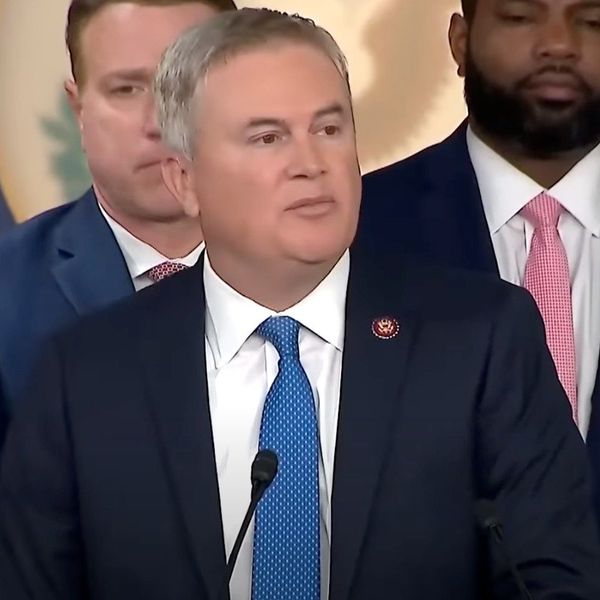
Chief Justice John Roberts
This article was produced by the Independent Media Institute.
If you're one of the 23.3 million Americans who depend on Obamacare for your survival, brace yourself for a looming disaster: In the midst of the deadly COVID-19 pandemic, President Trump is trying yet again to take away your health insurance, and this time he may succeed.
Having failed to persuade Congress to repeal Obamacare in 2017 (remember the historic "thumbs down" vote cast by John McCain), Trump now is asking the Supreme Court to reexamine the law, formally known as the Patient Protection and Affordable Care Act (ACA), and declare the entire statute unconstitutional in a new case—California v. Texas. The case, which began as a federal lawsuit filed by Texas and a group of other predominantly Republican-led states, has been added to the court's docket for the 2020 term, which starts in October.
The Trump administration could have elected to defend Obamacare, but instead chose to join Texas in the litigation to destroy it. A coalition of Democratic-led states has intervened in the case to support Obamacare.
The administration's arguments in California v. Texas are set forth in a complex 82-page brief filed by Solicitor General Noel Francisco on June 25. No matter what Trump tweets about Obamacare, those arguments represent the official position of the administration, and they will remain in force and effect even after Francisco, who has announced his retirement effective July 3, leaves government service.
Francisco's brief mounts a fresh attack on the ACA's "individual mandate" provision, the central pillar of the legislation that requires most Americans to buy or otherwise obtain health insurance, or be assessed a federal tax penalty. The solicitor general contends that because Congress reduced the mandate's tax penalty to zero as part of the Trump administration's December 2017 tax reform, the mandate can no longer be considered a constitutional exercise of Congress's taxing power. In 2012, the Supreme Court upheld the mandate under the taxing power in the landmark case of National Federation of Independent Business (NFIB) v. Sebelius.
The solicitor general also insists that the mandate is so fundamental to the structure of the ACA that it is "inseverable" from the act's many other sections and provisions. Thus, Francisco urges, if the mandate is no longer valid, the rest of the act must also fall, including the protections afforded to people with preexisting medical conditions that guarantee them access to health insurance.
If the court heeds the Trump administration and invalidates Obamacare, the impact on the country's already inadequate health care system will be nothing short of catastrophic.
If the court heeds the Trump administration and invalidates Obamacare, the impact on the country's already inadequate health care system will be nothing short of catastrophic. Stripped of Obamacare, millions of the most vulnerable Americans will be left to fend for themselves, unable to pay for necessary medical treatment. Many who have contracted COVID-19 could be denied insurance on the open market if the virus is considered a preexisting condition. Thousands, literally, could die.
And the problem won't be cured simply by voting Trump out of office. To restore the ACA or pass a stronger version of national health insurance like Medicare for All, the Democrats would have to sweep the November elections. In addition to winning the presidency, they would have to take the Senate and hold their majority in the House. That's a tall order even in a wave-election.
Fortunately, it's by no means certain that Trump will get his way in the Supreme Court. Whether he prevails will likely turn on the deliberations of Chief Justice John Roberts, who has become the most consistent swing voter on the bench, and has openly feuded with Trump on issues of judicial independence.
No one knows, of course, how Roberts will vote in California v. Texas, and anyone who tells you they do is wasting your time. Still, Roberts has an established track record on Obamacare, and in the past, has voted to uphold the act.
First and foremost, Roberts wrote the majority 5-4 opinion on the individual mandate in the NFIB case. His NFIB ruling marked the first time he broke ranks with his conservative colleagues to join the court's liberals in a 5-4 decision. And, as has been widely reported, he made up his mind to vindicate the mandate at the last minute, after initially aligning with the conservatives to strike down the law.
In 2015, Roberts also wrote the majority 6-3 opinion in King v. Burwell, which endorsed the ACA's outlay of tax credits to individuals who buy their health insurance on either state-run and federally-created insurance exchanges.
In both cases, however, Roberts's reasoning was narrowly constrained. This was especially true in NFIB, in which he held that the individual mandate, though valid as a tax, could not pass constitutional muster more broadly as an exercise of Congress's power to regulate commerce.
Roberts also voted in NFIB to invalidate the ACA's mandatory expansion of the Medicaid program, which offered the states increased federal funding to provide greater health care benefits to the poor. The states, according to Roberts, should be free to accept or decline federal funding to expand their Medicaid operations at their discretion. Some states, such as California and New York, have accepted additional federal dollars and bolstered their poverty programs. Others, like Texas and Florida, have not.
The limited fealty Roberts has demonstrated to the ACA in the past makes it impossible to accurately forecast how he will approach his task in California v. Texas.
Should Roberts opt to save Obamacare, there are several paths he could take. For starters, he could find, as even some right-wing commentators have acknowledged, that the December 2017 tax reform did not actually repeal the individual mandate. Rather, the reform merely zeroed out the tax penalty that was previously imposed. At any time, Congress could revive the penalty. So construed, the mandate, while presently dormant, would remain constitutional.
Roberts could also decide that even if the mandate is invalid because it no longer raises any tax revenue, it is severable from the ACA's multitude of other protections. Past Supreme Court decisions have established a presumption in favor of severability. Under the presumption, courts must strive to salvage acts of Congress, severing any unconstitutional provisions and leaving the remainder intact.
Roberts will no doubt be joined by the court's liberals if he upholds the mandate or, as a fallback, rules that it should be separated from the rest of the ACA.
But there is also little doubt that at least two of the court's conservatives will vote the other way in California v. Texas. Justices Clarence Thomas and Samuel Alito dissented in NFIB, arguing not only that the mandate is unconstitutional, but also against severance. It remains to be seen how the court's newest members—Justices Neil Gorsuch and Brett Kavanaugh, both staunch conservatives—will weigh in, but they cannot be counted on to join Roberts and the liberals.
Subverting national health insurance has long been a goal of the radical right, as typified by Ronald Reagan's diatribes against "socialized medicine" in the early 1960s. Although Reagan eventually softened his views, the most reactionary elements of the American right have not. Those elements now have the full backing of the 45th president of the United States, whose stunning lack of empathy has never been more apparent.
The chief justice of the nation's highest judicial body has the authority to blunt Trump's cruelty. The question we will all be asking this fall is whether John Roberts and the Supreme Court will rise to the occasion.
Bill Blum is a retired judge and a lawyer in Los Angeles. He is a lecturer at the University of Southern California Annenberg School for Communication. He writes regularly on law and politics and is the author of three widely acclaimed legal thrillers: Prejudicial Error, The Last Appeal, and The Face of Justice.
- Obamacare Supporters May Make States' Rights Case Before ... ›
- Trump And Georgia Officials Seek To Sabotage Obamacare - National Memo ›








